|
|
|
Sort Order |
|
|
|
Items / Page
|
|
|
|
|
|
|
| Srl | Item |
| 1 |
ID:
166711
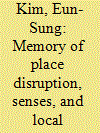

|
|
|
|
|
| Summary/Abstract |
The notion of place is quite useful to account for local acceptance of energy transitions. Using semi-structured interviews and content analysis, this article explores how new places are imagined or formed in opposition to wind farms in South Korea, with a focus on the memory of place disruption and sensory interactions with wind turbines. First, residents opposed to the construction of wind farms imagine negative places in opposition to future energy transitions, such as places in which landslides and ecological disruptions have occurred, based on trauma from past place disruption. Second, residents' sensory experiences of the noise created by wind turbines and the turbines' aviation-obstruction lights form concepts of artificial, urban, or mechanical places in opposition to the natural or rural quality of the places prior to wind turbine construction. These negative places that are formed based on memory and sensory input drive opposition to wind turbines. Therefore, place-people relations should be adequately and carefully discussed in both site-planning and community engagement processes associated with wind farms.
|
|
|
|
|
|
|
|
|
|
|
|
|
|
|
|
| 2 |
ID:
181681
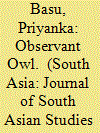

|
|
|
|
|
| Summary/Abstract |
The proliferation of print in mid nineteenth century Bengal witnessed several self-reflexive exercises in writing that tried to capture the incongruence between the colonial administration and indigenous everyday lives. Hutom Pyanchar Naksha (or The Observant Owl) written by Kaliprasanna Sinha (1862) is possibly the closest representation in print of such incongruities. This article focuses on the text of Hutom in relation to visual representations and reports by the colonial administration in contemporary English newspapers like The Hindoo Patriot, The Bengal Harkaru and others. In doing so, it will highlight the sensory world of colonial Calcutta that is so vividly captured in Hutom.
|
|
|
|
|
|
|
|
|
|
|
|
|
|
|
|
| 3 |
ID:
175120
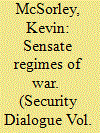

|
|
|
|
|
| Summary/Abstract |
This article explores the fabrication of ‘sensate regimes of war’, concentrating on the typically under-analysed sense of smell. Smell is a sensory mode capable of apprehending potential threat and enmity in ways that are orthogonal to other ways of sensing. Accordingly, the organization and interpretation of olfactory sensation occupies a distinctive place in war. The article details a particular genealogy of martial olfaction, exploring the olfactory capacities of soldiers and their augmentation through various non-human and technological means in specific milieus of combat. It notes how the distinctive affordances of smell have underpinned numerous wartime practices, from tracing improvised explosive devices to militarized manhunting. These developments supplement and trouble ocularcentric accounts of martial sensation and power that concentrate on the increasingly abstracted co-production of vision and violence in wartime. They highlight rather the significance of an alternative ontology of the signature or trace of enmity, and emphasize how in particular warscapes to smell is to kill. The article concludes by arguing that critical inquiry into war would benefit from a broader theorization of all its sensate regimes right across a sensorium that is itself being continuously transformed through war.
|
|
|
|
|
|
|
|
|
|
|
|
|
|
|
|
| 4 |
ID:
181683
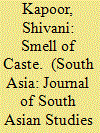

|
|
|
|
|
| Summary/Abstract |
Leather was an important commodity for the British empire in terms of industrial production and scientific innovation. From the mid nineteenth century in India, the British sought to convert leatherwork into a scientific industry. Leather, however, also has a life in caste. The profound stench inherent to the process of leather tanning marks leather workers as polluted. Examining archival material and contemporary ethnography from Uttar Pradesh, this paper examines how the scientific colonial intervention in leatherwork was made complicated due to the sensorial politics of caste. The leather chemist, trained to impart scientific knowledge to leather workers, often failed to negotiate the caste-based sensorial nature of leatherwork, thereby allowing caste to limit the reach of modern science in the industry. Understanding this interaction between colonial science and leatherwork has important consequences for our understanding of the politics of caste and scientific knowledge in India.
|
|
|
|
|
|
|
|
|
|
|
|
|
|
|
|
| 5 |
ID:
158929
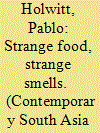

|
|
|
|
|
| Summary/Abstract |
This paper inquires into the meaning of food – specifically of food smells – for issues of urban citizenship in the context of urban renewal in Mumbai. The city’s southern neighbourhoods are currently being transformed by a process of chawl-redevelopment. Chawl-redevelopment is the primary governmental tool to open these areas up for new residential developments by demolishing old structures and constructing new high-rise enclaves for the rich, while simultaneously promising to provide in situ rehousing to the old, lower middle-class residents. A common feature of these new building complexes is that the most prestigious and luxurious new apartments are sold exclusively to vegetarians. While segregation between vegetarians and non-vegetarians in the real estate market is anything but a new phenomenon in Indian cities, I argue that both popular understandings of this practice and scholarly debates about citizenship fall short of grasping its complexity by essentializing affects or effects of food-based exclusion. Using the concept of sensorial citizenship, the paper analyses the mutual relation between rights and aesthetics in order to understand issues of exclusion and belonging in the contemporary Indian metropolis.
|
|
|
|
|
|
|
|
|
|
|
|
|
|
|
|
| 6 |
ID:
112764
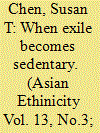

|
|
|
|
|
| Publication |
2012.
|
| Summary/Abstract |
Waltraud Kokot and her coauthors stated ' … . despite a necessary focus on transnational networks and movement, ethnographic studies of diaspora must also not neglect the realities of sedentary diasporic life.' Taking such a call as my point of departure, this article explores the quotidian experiences of 'in exile' specific to a subgroup of Tibetans in Dharamsala, north India, who have for a couple of decades at least described themselves as the 'India-born'. Secondly, it particularly attends to the sensory domains of these Tibetans' local/Indian experiences and in turn highlights the geo-affinity that they ambivalently feel for the place where they are at once native and exilic. Demonstrated in the article are the ongoing processes through which individuals, feeling marked by the displacement of the nation to which they belong, realize their Tibetan attributes in the context(s) they in varied ways perceive as 'Indian'.
|
|
|
|
|
|
|
|
|
|
|
|
|
|
|
|
|
|
|
|
|